
For your practice
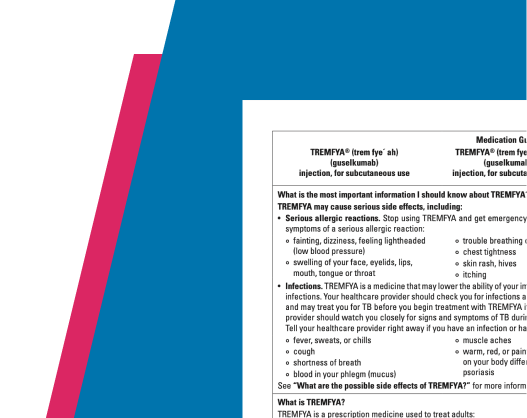
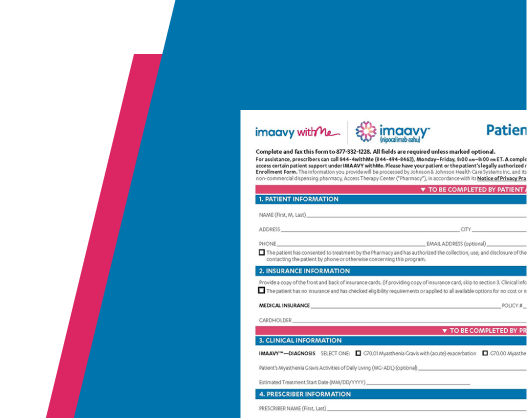
IMAAVY Dosing and Administration Guide
A complete guide with detailed dosing and administration information you need to get started.
Download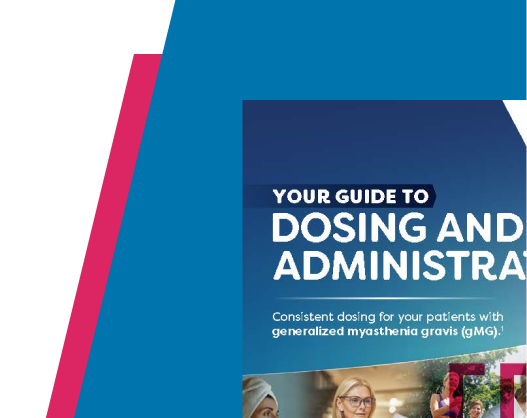
IMAAVY withMe Access Program Requirements — HCP
Defines IMAAVY withMe Access Program Requirements to HCPs for eligible patients.
Download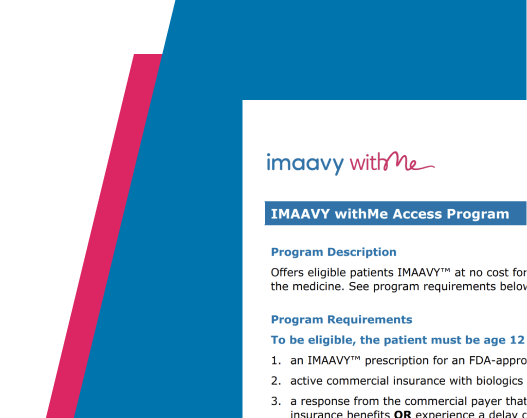
IMAAVY withMe HCP Brochure
Providers can learn about enrolling their IMAAVY patients into a program that offers free, personalized support to help patients get started and stay on their IMAAVY treatment.
Download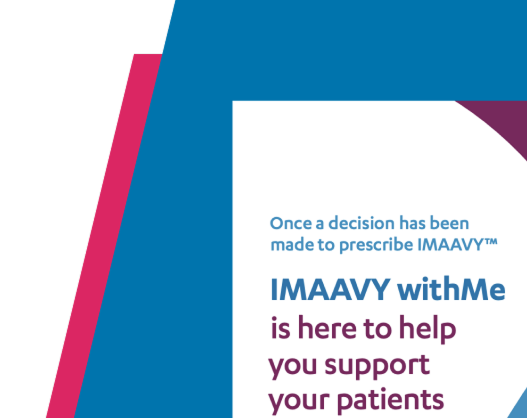
For your patients
IMAAVY Patient Brochure
Provide your patients with a one-stop-shop brochure for trial results, dosing, information on support resources, and more.
Download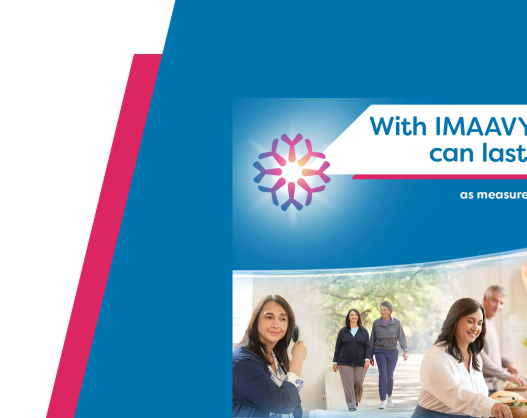
Myasthenia Gravis Foundation of America (MGFA)
Visit the MGFA website to learn more about gMG, discover advocacy opportunities, and find local events.
Visit the MFGA website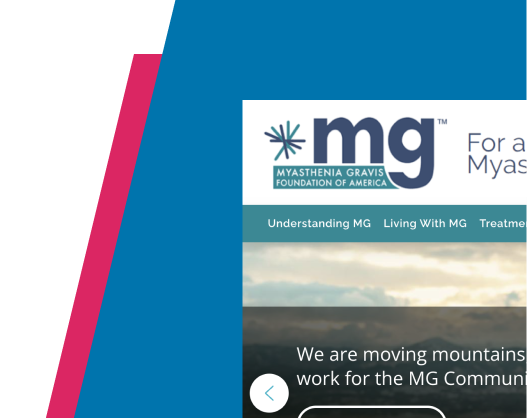
IMAAVY withMe Savings Program Web Flashcard
Outlines IMAAVY withMe Savings Program for eligible patients using commercial insurance.
Download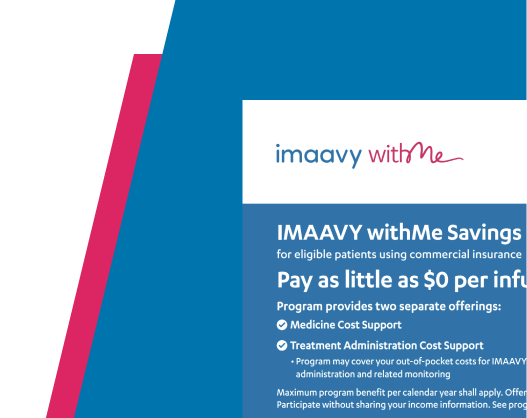
IMAAVY withMe Access Program Requirements — Patient
Defines IMAAVY withMe Access Program Requirements for eligible patients.
Download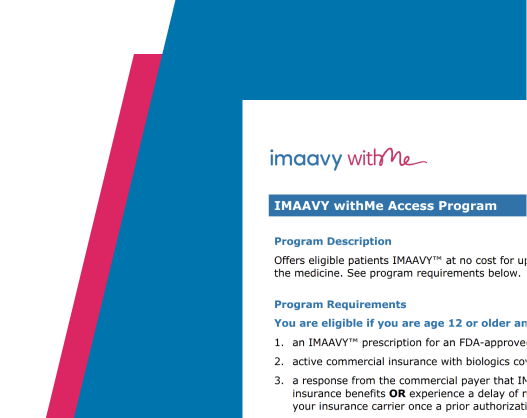
IMAAVY withMe Patient Affordability Brochure — Digital
Explains cost support options for patients.
Download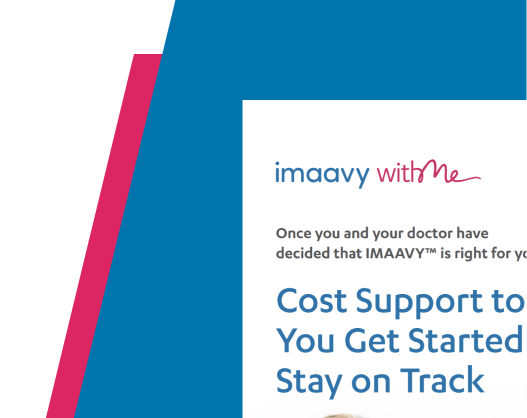
IMAAVY withMe Patient Brochure
A patient-friendly overview of this free support program that provides cost support, nurse guidance, and tailored resources to help patients get started and stay on IMAAVY treatment.
Download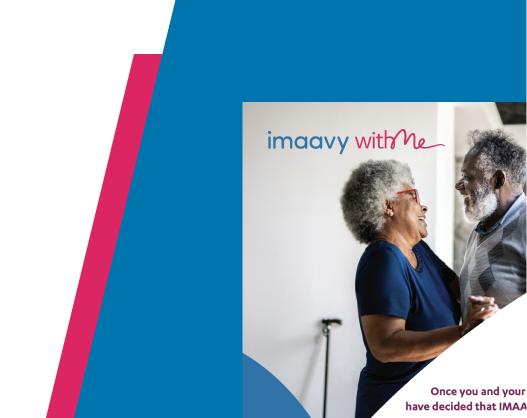
Frequently asked questions
Still have questions about IMAAVY?
Review the most frequently asked questions to learn more.
IMAAVY is indicated for the treatment of generalized myasthenia gravis (gMG) in adult and pediatric patients 12 years of age and older who are anti-acetylcholine receptor (AChR) or anti-muscle-specific tyrosine kinase (MuSK) antibody positive.1
There are limited data on the use of IMAAVY in pregnant women to inform a drug-associated risk of major birth defects, miscarriage, or adverse maternal or fetal outcomes. There is a pregnancy safety study for IMAAVY. If IMAAVY is administered during pregnancy, or if a patient becomes pregnant while receiving IMAAVY, healthcare providers should report IMAAVY exposure by contacting Janssen at 1-800-526-7736 or www.IMAAVY.com
IMAAVY is administered as an intravenous infusion lasting at least 15 minutes every 2 weeks (following an initial starting dose administered over at least 30 minutes).1
Please see Dosing and Administration Guide for more details.
The most common adverse reactions (≥10% of patients) for patients taking IMAAVY were respiratory tract infections (18%), peripheral edema (12%), and muscle spasms (12%). Rates of serious adverse events in both arms were similar (9% for IMAAVY, 14% for placebo).1,2
Please read the Important Safety Information located at the bottom of the screen and the Medication Guide to learn more about these and other risks for IMAAVY.
IMAAVY is a human IgG1 monoclonal antibody that binds to neonatal Fc receptor (FcRn), resulting in the reduction of circulating IgG levels.1
A fully human design may help to minimize immune reactions by resembling natural human proteins. It has a lower risk of eliciting neutralizing antidrug antibodies vs a nonhuman mAb.3
In the phase 3 pivotal study, the pharmacological effect of IMAAVY was assessed by measuring the decrease in serum IgG levels and anti-AChR and anti-MuSK autoantibody levels. In patients positive for anti-AChR and anti-MuSK autoantibodies who were treated with IMAAVY, there was a reduction in anti-AChR and anti-MuSK autoantibodies relative to baseline. Decreases in total IgG levels followed a similar pattern.1
IMAAVY does not impact IgG production; it reduces circulating IgG by binding FcRn and preventing IgG recycling. In the phase 3 pivotal study, the pharmacological effect of IMAAVY was assessed by measuring the decrease in serum IgG levels and anti-AChR and anti-MuSK autoantibody levels. In patients positive for anti-AChR and anti-MuSK autoantibodies who were treated with IMAAVY, there was a reduction in anti-AChR and anti-MuSK autoantibodies relative to baseline. Decreases in total IgG levels followed a similar pattern.1
IMAAVY binds to FcRn with high specificity and high affinity at both neutral (extracellular) and acidic (intracellular) pH levels, resulting in the reduction of circulating IgG levels, including those of pathogenic IgG.4
IMAAVY demonstrated a reduction only in immunoglobulin G (IgG).1




Once you’ve made the decision
to prescribe IMAAVY™
Sign your patients up for support to help begin their IMAAVY™ journey

